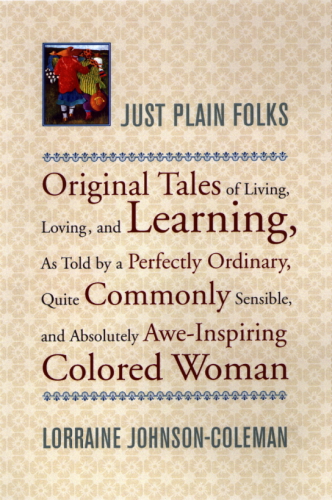
Just Plain Folks
کتاب های مرتبط
- اطلاعات
- نقد و بررسی
- دیدگاه کاربران
نقد و بررسی

September 1, 1997
In this omnibus of self-styled "original tales," folk-culturist and storyteller Johnson-Coleman takes readers to the hearth, to the fields and to the church, seeking to convey those elements of the tradition of the African American South that are too often overlooked in the emphasis on slavery and discrimination. Johnson-Coleman developed 21 first-person stories from interviews with the residents of Farmville, N.C., her ancestral home. She then embellished with poetry, philosophy and anthropological texts that explain various customs mentioned in the stories. Thus, these simple, rural tales are tied to a tradition that began 300 years ago when the first slaves were brought from Africa to the American South. Among the affectionately fictionalized characters are Sister Nellie, self-appointed town genealogist; six-year-old Martha, who thinks water in the drinking fountain marked "colored" is rainbow water; and the opinionated Reverend Joyner. The narratives sometimes skid from folksy to hokey, as when one of her characters says: "Now I ain't got me no kinda understandin' 'bout birthin' no babies." Still, the collection is not all picnics and prayers. Lynching, rape and segregation's indignities make dramatic appearances, and the black residents of Farmville face their lives with a strength drawn from an unshakable religious faith. Despite its hammy moments, Johnson-Coleman's fictional debut is an informative and richly textured contribution to our understanding of African American culture.

May 1, 1999
YA-Folklorist Johnson-Coleman's theme of knowing and respecting one's ancestral roots is clearly recorded in these unforgettable short stories. Based on interviews the author conducted while traveling through her homeland of North Carolina, the selections celebrate the cultural heritage of rural blacks. The author introduces everyday people who lived during times of slavery, Reconstruction, the Depression, and the Civil Rights era. What they have in common is a sense of pride, loads of wisdom, and values that are still applicable and needed in today's world. Six chapters cover family members, neighbors, female/male relationships, young people, Jim Crow laws, the religious populace, and even a version of the folktale "Wiley and the Hairy Man." Each one ends with an "Afterthought" that puts the story in context. For example, in "Call Me by My Name, the author tells of her childhood dislike of her name until her grandfather explains its origins. In the conclusion, she explains the history of the African-American naming custom. The tales are hilarious and harsh, and the dialogue moves at a rapid pace. Young adults will find rousing music, love in all shapes and sizes, and genuine characters here.-Connie Freeman, Allen County Public Library, Fort Wayne, IN
Copyright 1999 School Library Journal, LLC Used with permission.

























دیدگاه کاربران